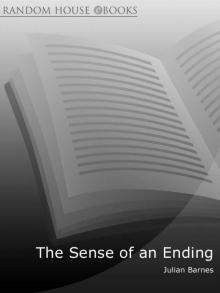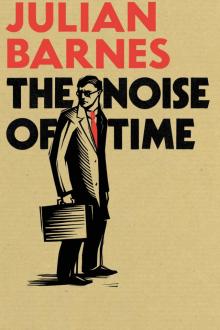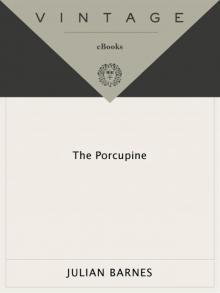- Home
- Julian Barnes
Something to Declare Page 16
Something to Declare Read online
Page 16
“We recognize at the outset that we cannot know the vicissitudes of his intrauterine life.” Not even Sartre will invade Mme Flaubert's womb. And there are some other frustrations for the investigative psychobiographer: “the nursing, the digestive and excretory functions of the infant, the earliest efforts at toilet training … about these fundamental givens, nothing.” If only Gus-tave's parents had had the foresight to preserve one of Gustave's earliest stools; if only the fossilized excrement had been passed down to the Musée de Rouen … Ironically, just before The Family Idiot came out here, De Beauvoir was publishing La Cérémonie des adieux, in which she usefully records the bladder malfunctionings which set in during Sartre's final illness.
But there are few other areas where Sartre fails to tread. As he prowls round the infant Gustave—necessarily mute from such a distance—he sometimes reminds us of another French experimenter and theorist: Jean-Marc Itard, who spent years trying to make the Wild Boy of Aveyron talk. In the same way, Sartre prods and pokes at Gustave, treats him alternately with kindness and frostiness, and is everywhere indefatigable.
The psychoanalytic insights offered by Sartre are always Olympian and frequently crass. The father of Flaubert's mother died when she was ten: this makes it inevitable that “she would only marry her father.” Her mother had died in giving birth to her: consequently, when she suckles her first daughter, “she gave herself the breast in order to obliterate from the present the indestructible frustrations of the past; she made love to herself so that she could at least give the tenderness that she had not received.” Achille, Gustave's elder brother, is naturally kitted out with an off-the-peg Oedipus complex. Unfortunately for him its working-out goes wrong. When the father, Achille-Cléophas (head of the hospital at Rouen), falls ill, he instructs his elder son to operate on him. In the course of the operation he dies. Sartre comments: “The most unexpected result of this relationship is that the old man, by giving himself up to the knife, deprived his elder son of even the possibility of deliverance through the classic murder of the father; certainly Achille killed him, but he made himself the docile instrument of a sacred suicide.” The proof that Achille has been cheated out of the necessary liberating murder comes in the next paragraph: when he stepped into his father's shoes as head of the Hôtel-Dieu, Achille also stepped into his father's old goatskin coat. This garment, the argument runs, was already eccentric and unfashionable when his father had worn it on his rounds: it would have been “aberrant” by the time the son took it on. Yet he could not now avoid this flapping symbolic mantle. “Polished, refined by his new friendships, he was urbane in the salons, a clod on his rounds; in both instances, actually, he perpetuated the paterfamilias.” Or maybe he just liked the coat …
There is a matching inflexibility in Sartre's Marxist analysis of Flaubert's social origins. His parents were mere functioning units going through their bourgeois programme; the ambitions, social behaviour, attitudes to property and family of this “semi-patriarchal community” can all be easily predicted. The Flauberts automatically pursue their dream of upward mobility (as if anyone ever pursued a dream of downward mobility), and the relations between Gustave and Achille-Cléophas “incarnate the drama of French society.” Moreover, the sly wrong-footing of Marxist criticism is also in evidence: characters can first be reduced to easily comprehensible social automata, with scarcely an atom of free will, reliant (like Flaubert's father) on the chance mutation of intelligence in order to advance themselves; and then these ruthlessly conditioned social automata can be despised for not being more humane, more enlightened, more twentieth-century Thus Sartre, of Achille-Cléophas's (undocumented) firmness with Gustave when teaching him to read: “125 years later, better-informed about the nature of childhood, we accuse the medical director of having aimed too high, too quickly, and of having bewildered his unhappy pupil by allowing him to see his exasperation.”
“We accuse …” Yet perhaps this arrogance is not quite what it seems. There are times—many times—when Sartre seems impatient and scornful of Flaubert's immediate family, when he seems to want that family to be in as great a state of postulated discord as possible, when he seems to cry openly, with Gide: Families, I hate you. But perhaps this is to overemphasize Sartre's political and biographical presence in L'Idiot, and to underestimate his literary presence. In part, the biographer adopts the bullying, chivvying tone he does because the characters under examination are his own creation. He has revived them and fleshed them out, so he naturally awards himself extra rights in their behaviour. Thus he is at the same time the scientific, unsurprised Marxist and the intuitive but irritated novelist. It is easy to forget this ambivalence, to underestimate the fictional alloy present in L'Idiot, though the literary company Sartre keeps sometimes looks a bit seedy. Take the account of Mme Flaubert's pregnancy, which led to Gustave's birth:
Nine highly agitated months. She must have imagined everything, poor Caroline, she must have hoped and despaired, sometimes welcoming a future daughter as celestial manna, at others spitting into the ashes to deny the imminent son. No doubt these agitations of the soul remained hidden. But she could not dissemble her ardent wish to have a girl, to re-create herself …
Given that paragraph blind, where would you place it? Somewhere in the Imagine-the-Heartbreak school of popular biography, I should imagine, where the word “must” is always a giveaway.
Of course, to say that swathes of L'Idiot are fiction is not to deny them the possibility of truth. Nor, on the other hand, is it to assert that they are well written. L'Idiot is, indeed, an outstandingly badly-written book (the dust-wrapper of Carol Cosman's translation disarmingly warns us that it conveys all the nuances of Sartre's style “from the jaunty to the ponderous”). The contrast with Les Mots, swift, supple, and economical, is saddeningly instructive. But then Sartre was always fighting against the allure of lucidity, against the guilt induced by pleasing the reader. There is a warning exchange in La Cérémonie where de Beauvoir quizzes him on the value of good writing. “Sometimes even,” she begins, “you were disgusted with literature; you used to say, Literature is shit. What exactly did you mean? And from time to time, more recently, you have said to me: after all, it's stupid to work at expressing oneself; you seemed to be saying that one only had to write, as it were, any old how. Moreover you told me that this is how you wrote your Flaubert, which isn't entirely true.” Sartre growls back: “It isn't true.” De Beauvoir retreats with, “There are many felicities in your Flaubert,” and Sartre replies: “I write faster now. But that comes from having worked at it.”
No one, of course, would admit that he wrote worse than he used to, especially not by design. I just write differently, that's all, more quickly; but then, as Sartre goes on, “I believe that the best writing is always done without too much working over.” However generously we feel inclined to interpret the ageing Sartre's remarks, his is an ironic conclusion to reach while engaged on a study of the finest, the most literary, and the least engagé of French nineteenth-century novelists. “La littérature, c'est de la merde.” “Oh yes, who are you working on at the moment?” “Flaubert, of course.” This makes shocking, almost insulting, the rare occasions in L'Idiot when Sartre chooses to quote Flaubert: suddenly we are reminded that it is perfectly possible—indeed, it seems actively desirable—for high intelligence, piercing insight, and scrupulous concentration to be combined with extreme lucidity of expression. One of the rogue myths of criticism is that difficult ideas can only be expressed or elucidated in dense and difficult language. When one falls routinely on sentences like “Praxis becomes the efficacy of the passive because the child's conditioning strips him of any means of affirming himself, even the positive act of negativity,” it pays to remember the first act of practical criticism inflicted on the young Flaubert. When Louis Bouilhet and Maxime du Camp rubbished his ornate first version of La Tentation de Saint-Antoine, they reminded him of La Bruyère's advice: “If you want to say that it is raining, say: ‘It is raini
ng.’”
As you machete your way through the prose, however, the jungle partly begins to clear. The heart of the first volume is a rich and plausible imaginative hypothesis about the inner life of the young Flaubert, with its profitable passivity and fecund neurosis. The evidence is of two sorts: occasional documentation (Flaubert's letters, his niece's memoir of him), and internal evidence drawn from the adolescent stories (largely inaccessible to English readers). In his exposition of these stories Sartre is at his most resourceful: a swift and ruthless pursuer of the subtext and the Freudian implication (here Flaubert is shown wanting to kill his entire family; there just his brother; over here Satan represents Gustave, God represents Achille-Cléophas). No one will now be able to read these texts without bearing in mind Sartre's psychological parallels, and the “proud confessions” of hatred, envy, and sublimated murder which he discerns.
Whether Sartre's critical reading is right is another matter, of course. It is frequently plausible, but it is vigorously one-sided in method. These early stories—rancid items of romantic sex and violence, for the most part—are highly derivative, sometimes direct parodies or exercises. The scented influence of writers like Petrus Borel is paramount. Yet Sartre declines to discuss literary genesis, to examine how far the motifs he interprets as being Gustave 's private neuroses writ public are in fact provided ready-made by the writers he imitates. Sartre's reason for not doing so is curt: of course Gustave is being imitative—but the real question is, what made him choose to imitate this rather than something else? His unconscious clearly directed him to rewrite, parody, expand items of direct psychological concern to him. Perhaps; yet how wide was the choice of imitable texts—the real, likely choice, given Gustave 's age, reading, and surroundings? Is it all that surprising for an adolescent to produce stories littered with sex, madness, and death when he lives above the morgue, and when from the age of six he had been taken for educative walks by an uncle who liked to drop in at the lunatic asylum and then linger in the prostitutes' quarter? And what, furthermore, is the likelihood of Sartre not being able to read envy and revenge into whatever adolescent stories Flaubert might have written?
As for the documentary evidence, even Sartre admits that it is thin and unreliable. His starting-point for this whole enterprise— for the presumption of the young Gustave's “idiocy”—comes from a piece of “decorous gossip” written by Flaubert's niece, Caroline Commanville, after his death. She reports the family tradition that he was slow in learning to read (adding, however, that he was “avid for knowledge and his brain was always working”); then records that he would often as a child sit “for hours, one finger in his mouth, absorbed, looking almost stupid,” and that once, when he was six, “a servant called Pierre, amusing himself with Gustave's innocence, told the boy when he pestered him: ‘Run to the kitchen … and see if I'm there' ”—which the child duly did.
Not much, is it? Yet Sartre immediately applies the magnifying glass and expands the child to “pathologically credulous”; while his parents, we are assured, “searched his features and feared he was an idiot.” Is Gustave's instant departure towards the kitchen that credulous? How many parents would back their own six-year-olds not to fall for a similar straight-faced wheeze? As for the idiocy: Gustave was, it is true, slower at learning to read than his sister, but the memoir continues with an incident which might well be held to confirm precocious intelligence. Before he was taught his letters, Gustave was often read to by an old family friend called Papa Mignot. Caroline Commanville reports that when there were scenes over Gustave's slowness in learning to read, the child's final argument, “to his mind irrefutable,” was “What's the use of learning when Papa Mignot reads to me?” Not quite as good, perhaps, as Jean-Paul's “Je les vivrai,”but hardly the sort of response to have parents scanning the infant face for signs of idiocy. Sartre ignores this part of the memoir, and supports his thesis more by bullying repetition than anything else. The twentieth-century Freudian orthodoxy is that of the artist as neurotic; Sartre expands this into a wider orthodoxy of the genius as idiot. In fact, it's rather a Hollywood notion, a literary version of Log Cabin to White House, sentimental, and a bit vulgar. “I see it all … the small boy, his thumb in his mouth … the great writer having difficulty with his letters … and a little wood-burning stove in the background …”
Sartre is much stronger on the less contentious subject of Flaubert as neurotic, on the big, strapping youth mysteriously laid low by spiritual scurvy. The passivity, the pessimism, the malice, the “option of hysteria,” and the “precocious senility” are fictionalized together into a convincing flow. I'm not sure the lengthy result is more vivid than Flaubert's own deliberations on the subject: he once described his adolescent self as “a mushroom swollen with boredom.” But then Sartre seems unwilling—too jealous, even—to give Flaubert his head in quotation.
“Critic. Always eminent. Held to know everything, to have seen and read everything. If you disagree with one, call him Aristarchus, or eunuch.” Flaubert's definition from the Dictionnaire des idées reçus doesn't exactly come home to roost. Eunuch? Hardly. Aristarchus? Well, Sartre didn't really cut or change bits of Flaubert— rather the opposite, in fact. But his zeal to transform an instance of life into an instance of dogma, a proof of theory, brings to mind the words of the American artist Stuart Davis: “It has been scientifically established that the acoustics of Idealism give off the Human Sound of Snoring, whereas Reality always says ‘Ouch!' ” Sartre could also be accused of not having learnt one lesson taught by the object of his study. Flaubert died in 1880; Sartre in 1980. Flaubert left unfinished Bouvard et Pécuchet, in which he sought to enclose the whole of knowledge, the whole of the world, the whole of idiocy; Sartre left unfinished L'Idiot de la famille, in which he sought to enclose and subdue Flaubert, master writer, master bourgeois, the sage, and the enemy. Sartre condemns Bouvard et Pécuchet, first as “colossal and grotesque,” later as “vast and monotonous.” All four adjectives can safely be transferred to his own work. It is a vast folly, erected with “admirable but mad” single-mindedness. There it stands, and surely, you think, the view from the top must be splendid. But no: Climb up and you only see a little more than you do from the road.
(10)
Not Drowning But Waving:
The Case of Louise Colet
Louise Colet in riding costume, by Courbet
Who burned Louise Colet's letters to Flaubert? For a century it was taken for granted that the destroyer was Flaubert's niece Caroline, the inheritor of his literary estate. Caroline, the stiff, correct, high-bourgeois protector, “la dame si bien,” who in publishing her uncle's correspondence cut out any passages she deemed intimate or indecent, suppressed uncomplimentary opinions, changed his punctuation, and tidied up his phrasing; who wouldn't allow the expression “tenir le bec hors de l'eau” (“keep your snout above water”) in a letter to Turgenev, gentrifying it into “tenir la tête hors de l'eau” (head). Such editorial interventionism was of the period: when negotiating with Louise Colet's equally proper daughter, Mme Bissieu, Caroline received permission to publish 138 of Flaubert's letters to Louise (and none of the more unbuttoned ones) on the condition that she changed tu to vous throughout. What could be likelier, in this suppressive, censoring, cleaning-up ambience, than that Caroline, while adjusting her uncle's image into something more Pantheonic and less fun, should dispose of the no doubt licentious outpourings of the notoriously pesky Louise?
Hermia Oliver's Flaubert and an English Governess quietly but pertinaciously queried this assumption. Caroline may have offered the public a pasteurized version of her uncle, but her tampering had an innate probity to it. She deleted and rewrote, but never touched the manuscripts themselves: everything was done in the transcription. Further, Caroline's own niece testified that her aunt's attitude towards the literary estate—manuscripts, notebooks, dossiers, even her uncle's library—was that “it was absolutely nec essary to preserve all of them.” And finally, while there
is no specific evidence to finger Caroline as vandal, there is already one documented destroyer of the novelist's correspondence: Flaubert himself. In 1877, warned about what might happen after a writer's death by the publication of Mérimée 's Lettres à un inconnu, Flaubert and Maxime Du Camp burned most of their youthful letters to each other. The correspondences with Ernest Chevalier, Louis Bouil-het, and Georges Pouchet were drastically thinned for similar reasons. Another burning session took place in May 1879. Flaubert wrote to his friend Edmond Laporte: “Yesterday I spent eight hours sorting and burning letters, a long delayed job, and my hands are shaking from tying up packets.” Hermia Oliver adduces as corroboration a hitherto ignored account by Maupassant in L'Echo de Paris of 24 November 1890, in which he recalls a bonfire night at Crois-set “a year before” Flaubert's death—i.e., in 1879. Maupassant describes “a little silk dancing shoe,” containing a faded rose and a yellowing lace-edged handkerchief, being cast into the flames. This was almost certainly Louise Colet's slipper, as hymned by Flaubert in a love letter to her of August 1846. “It can surely hardly be doubted,” Hermia Oliver concludes, that among the letters destroyed that night were those of Laporte, Caroline's English governess Juliet Herbert—and Louise Colet. This conclusion is the point of departure for Francine du Plessix Gray's biography and rescue-act:
I believe that those last missives … were the many hundreds of letters written to Flaubert by Louise Colet. That is why I have written this book. To reinstate a colleague into the annals of her time. To do her justice. To resurrect yet another woman whose memory has been erased by the caprices of men.
Louise Colet was born in Aix-en-Provence in 1810 and came to Paris with her music-professor husband Hippolyte in 1835. She swiftly established herself as a poet, a beauty, and a salon-goer. She won the Académie Française 's prize for a poem on a set theme four times, and was awarded a government pension. She found a long-term protector in Victor Cousin, supporters in Béranger and Victor Hugo, lovers in Musset, Vigny, Flaubert, and Champfleury. She posed as Sappho for the sculptor Pradier, and frequented the salon of the ageing Mme de Récamier. She had, as Gray generously puts it, “a reverence for glory.” This word, which features much in Louise's life and musings, was the cause of her key disagreement with Flaubert over “the glory of Corneille.” He also rebuked her sternly for having “the love of art” but not “the religion of art.”

 The Sense of an Ending
The Sense of an Ending The Noise of Time
The Noise of Time Metroland
Metroland Letters From London
Letters From London Before She Met Me
Before She Met Me Pulse
Pulse Flaubert's Parrot
Flaubert's Parrot England, England
England, England The Porcupine
The Porcupine The Only Story
The Only Story Love, Etc
Love, Etc Through the Window: Seventeen Essays and a Short Story
Through the Window: Seventeen Essays and a Short Story Staring at the Sun
Staring at the Sun Cross Channel
Cross Channel Levels of Life
Levels of Life Arthur & George
Arthur & George Love, Etc.
Love, Etc. A History of the World in 10 1/2 Chapters
A History of the World in 10 1/2 Chapters Something to Declare
Something to Declare Through the Window: Seventeen Essays and a Short Story (Vintage International)
Through the Window: Seventeen Essays and a Short Story (Vintage International)